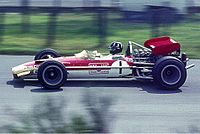Graham Hill
Norman Graham Hill (15 February 1929 – 29 November 1975) was a British racing driver, rower and motorsport executive, who competed in Formula One from 1958 to 1975.
He initially joined Lotus in Formula One as a mechanic, before earning a driving debut with the team at the 1958 Monaco Grand Prix and securing a full-time contract.
After non-classified championship finishes in 1958 and 1959 with Lotus, Hill moved to BRM in 1960, scoring his maiden podium at the Dutch Grand Prix.
Helping develop the Lotus 49 for the new Cosworth DFV engines, Hill struggled with reliability throughout 1967, with podiums in Monaco and the United States.
Throughout his early years, Hill also competed in the British Saloon Car Championship, topping his class in 1963, and entered six seasons of the Tasman Series, finishing runner-up to Stewart in 1966.
He was conscripted into the Royal Navy and served as an Engine Room Artificer (ERA) on the light cruiser HMS Swiftsure, rising to the rank of petty officer.
"[9] After teammates Jim Clark and Mike Spence were killed in early 1968, Hill led the team, and won his second world championship in 1968.
The Lotus had a reputation of being very fragile and dangerous at that time, especially with the new aerodynamic aids which caused similar crashes of Hill and Jochen Rindt at the 1969 Spanish Grand Prix.
Typically, when asked soon after the crash if he wanted to pass on a message to his wife, Hill replied "Just tell her that I won't be dancing for two weeks.
Colin Chapman, believing Hill was a spent force, placed him in Rob Walker's team for 1970, sweetening the deal with one of the brand-new Lotus 72 cars.
The team was in flux after the retirements of Sir Jack Brabham and then Ron Tauranac's sale to Bernie Ecclestone; Hill did not settle there.
Hill was known during the latter part of his career for his wit and became a popular personality – he was a regular guest on television and wrote a notably frank and witty autobiography, Life at the Limit,[11] when recovering from his 1969 accident.
The head of St. John the Baptist appears (with a stuck-on moustache in Hill's style) on a silver platter, which runs around the floor making putt-putt noises of a race car engine.
As his F1 career drew to a close he became part of the Matra sports car team, taking a victory in the 1972 24 Hours of Le Mans with Henri Pescarolo.
This victory completed the so-called Triple Crown of Motorsport which is alternatively defined as winning either: Using either definition, Hill is still the only person ever to have accomplished this feat.
After failing to qualify for the 1975 Monaco Grand Prix, where he had won five times, Hill retired from driving to concentrate on running the team and supporting his protege Tony Brise.
Along with Stirling Moss, Hill put his name to and supported the Grand Prix Midget Championship, which started in 1975, with the aim of bringing low cost motor sport to people who wanted to try a new career.
He met his future wife Bette at a Boxing Day party at Auriol and, while courting her, he also coached her clubmates at Stuart Ladies' Rowing Club on the River Lea.
He also stroked the London eight in the highly prestigious Grand Challenge Cup at Henley Royal Regatta, losing a semi-final to Union Sportif Metropolitaine des Transports, France by a length.
In 1968 when the club began a financial appeal to modernise its clubhouse, Hill launched proceedings by driving an old Morris Oxford, which had been obtained for £5, head-on into a boundary wall.
It really taught me a lot about myself, and I also think it is a great character-building sport...The self discipline required for rowing and the 'never say die' attitude obviously helped me through the difficult years that lay ahead."
Hill adopted the colours and cap design of London Rowing Club for his racing helmet – dark blue with white oar-shaped tabs.
[26] Hill died on 29 November 1975 at the age of 46 when his Piper PA-23 Aztec twin-engine light aircraft crashed near Arkley in the London Borough of Barnet, while on a night approach to Elstree Airfield in thick fog.




